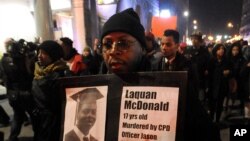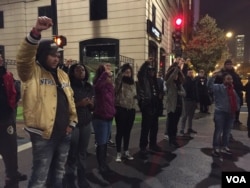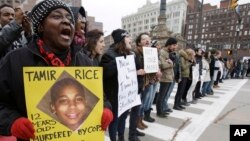The Chicago police force has responded to months of controversy over allegations that the city's police are using excessive force by releasing dashboard-camera videos and other materials from 101 police cases in which civilians were injured at the hands of police officers.
The move by the city's Independent Police Review Authority was a turnaround for the city government that fought for nearly a year not to release a video showing an officer killing a teenager in 2014 by shooting him 16 times while the teen lay on the ground.
The IPRA investigates allegations of police misconduct and excessive force, in hopes of addressing tensions between Chicago's civilian residents and its police. It evolved in the fallout from the Laquan McDonald case, in which the white police officer, Jason Van Dyke, was eventually charged with murder for the death of McDonald, who was black.
The city fought for a year to keep the video private, citing an ongoing investigation. When the video was released last November, violence surged in the city.
Shootings have risen by 50 percent for the year, and some 230 people have been killed. Analysts say civilians have grown to distrust the police, and have become reluctant to provide information that could aid an investigation.
In a radical change from the city's earlier policy not to release materials from ongoing investigations, the head of the IPRA, Chief Administrator Sharon Fairley, said evidence will be provided within 60 to 90 days of an incident.
"Timeliness has plagued this agency" in the past, she said, but also cautioned that videos and other materials released may not necessarily give a full picture of what happened.
Improving transparency
The 101 cases in Friday's release include every open investigation into officer-involved shootings, whether or not anyone was hit, and every case in which a civilian was seriously injured or killed, according to the review board.
Fairley said the release is meant to help restore trust in the police force.
In March, the state's attorney for Cook County, who waited 13 months to prosecute Van Dyke in the Laquan McDonald case, was voted out of office. In April, a mayor-appointed task force investigating the police department said racism has long contributed to a pattern of failures by the department.
The report by the Chicago Police Accountability Task Force said in its April report that police in Chicago have "no regard for the sanctity of life when it comes to people of color."
National debate
Chicago's problems put the city at the center of a national debate on whether police officers unfairly target people of color.
A U.S. Justice Department survey found last year that there is no national standard for the way local police departments track use of force, making any data on the subject difficult to use for policy making. Some large cities refused to provide data at all.
Some cities are embracing a trend toward peaceful resolution of conflicts by offering more training to officers. Others reward police for handling violent situations without use of physical force.
In Philadelphia, which has a reputation for street violence and tough officers, more than 40 police officers have received awards in the past six months for defusing conflicts without using maximum force, such as shooting or striking anyone.
In Los Angeles, police can be awarded a Preservation of Life medal for using restraint while resolving dangerous incidents. The U.S. Justice Department plans to institute a community policing award later this year to reward officers who manage to deescalate tense situations without violence.
But the new trend has its critics.
In Chicago, the union Fraternal Order of Police has spoken out against the release of the police records, calling the move "irresponsible." And in L.A., the police union has called the Preservation of Life award "a terrible idea that will put officers in even more danger."






